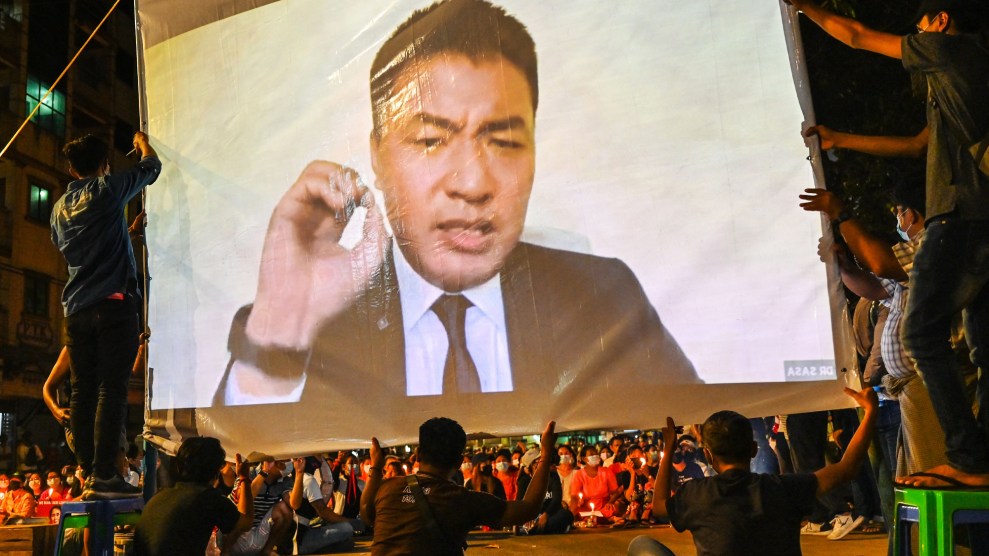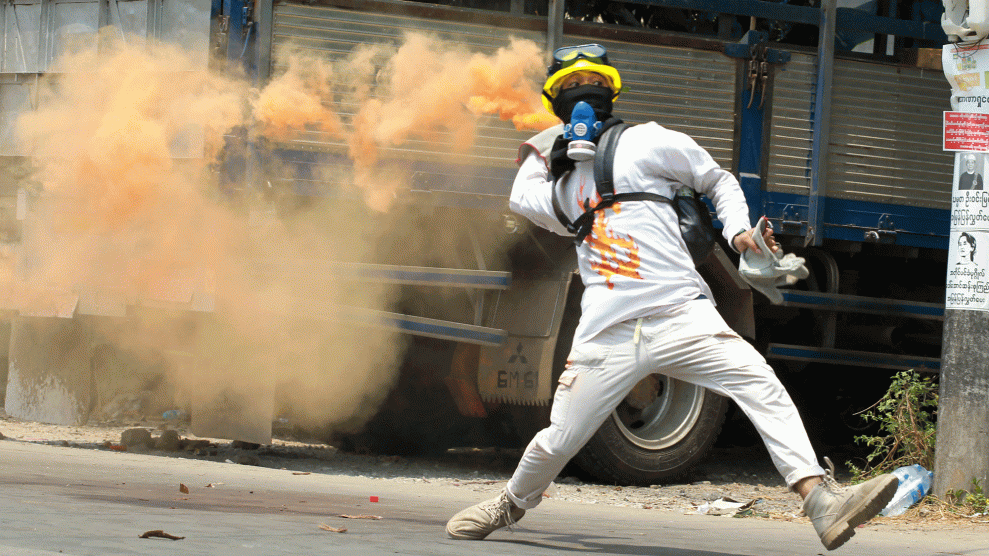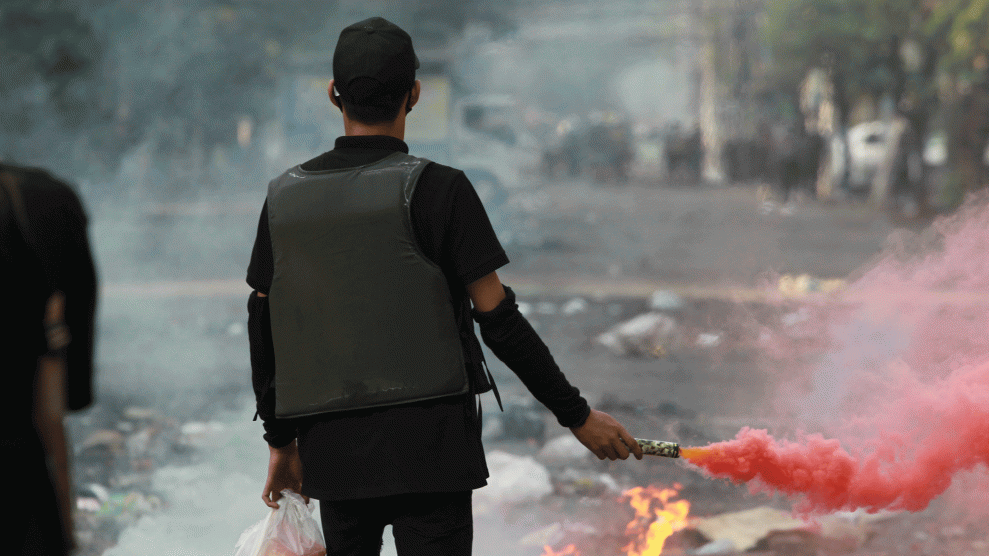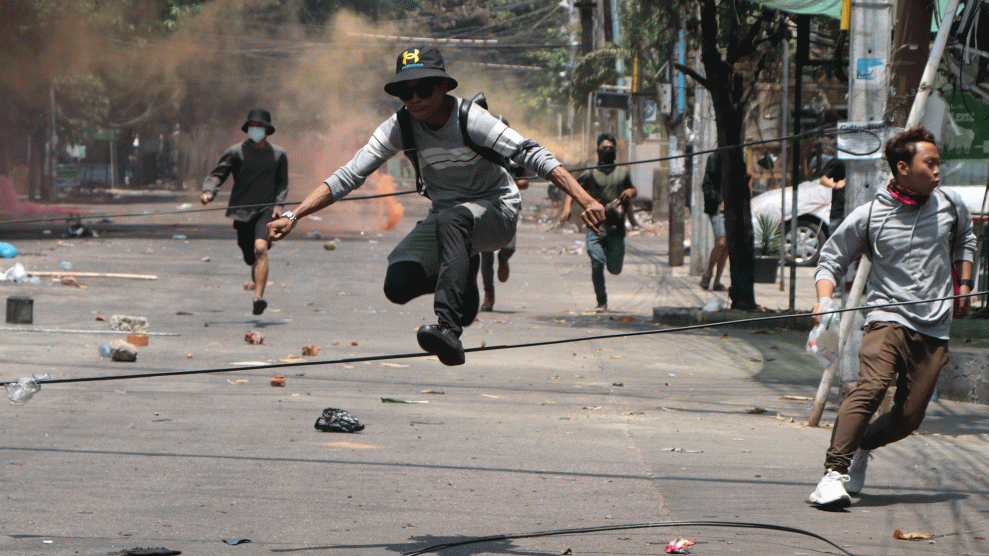
Dr. Sasa is projected on a screen during a demonstration against the military coup in Yangon on March 13, 2021.STR/AFP/Getty
Dr. Sasa cannot tell me where he is located. On a Zoom call last week, he seems to be in a sparse office space. Wearing a gray suit and blue tie, Sasa, a slim fellow with close-cropped dark hair who smiles easily, is sitting at a desk, next to a bookshelf that holds a few volumes, including a Bible. There is nothing on the pale yellow wall behind him. He won’t say what country he is in. Or even what hemisphere or time zone. “Security,” he explains. He will only note that he has to change his location frequently—and this has been the case since he fled Myanmar in the wake of the brutal military coup in February that ousted the recently elected democratic government.
Sasa is one of the leaders of the National League for Democracy, the political party that won the national election in November and was overthrown by the military. Many of his colleagues, including Aung San Suu Kyi, the head of the NLD, were arrested and remain detained. (U Nyan Win, an NLD spokesperson arrested by the military, died last month of COVID-19 contracted in a notorious Myanmar prison.) But Sasa managed to avoid arrest and escaped. So the task of representing the deposed government to the rest of the world has fallen to Sasa, a medical doctor and political novice, and he has a message for the Biden administration: The citizens of Myanmar need more help than Washington has so far provided.
Sasa, who grew up in a remote jungle village in Chin State in the western part of Myanmar, was in Naypyitaw, the capital city on February 1, when the military seized control and declared a state of emergency. He was due to become a senior official in the new NLD-led government. “I saw I had to escape,” he recalls. As NLD officials were being rounded up, his party colleagues told him that he should flee if he could. Sasa went into hiding and looked for a way out of the city. He packed a bag and disguised himself as a taxi driver. He approached other drivers, told them he was a driver from Chin State, and asked to be transported to a location he won’t now identify. Most drivers turned him down. But eventually he found one who agreed. Together they drove through checkpoints and eventually reached a spot where Sasa could travel further on his own on a motorbike. He ended up in a safe location. The entire trip took three days. “I can’t detail the travel,” he says. “The people who helped me could get in trouble.” But, he adds, it was full of “zig and zag.”
Were he to return to the capital, Sasa remarks, “I would be arrested or killed.”
Immediately after the coup, Sasa served as the ousted government’s representative to the United Nations. He is now the minister for international cooperation of the National Unity Government (NUG), which was formed by the NLD, other minor parties, and ethnic minority insurgent groups. The NUG has established a set of ministries and has been drawing up ready-to-roll plans for governing if the coup is defeated and the elected representatives regain power. “Don’t call us a government in exile,” Sasa says. “We are the government in waiting.”
The NUG officials have been meeting virtually. The individual ministries have set up websites. “We are an e-government,” Sasa says. And these virtual ministries have been relentlessly attacked with computer viruses. Sasa and his colleagues worry they are being tracked by the junta through their phones and computers.
Sasa’s journey to leading a virtual government has been an arduous one. When I ask him how old he is, he cannot say. He doesn’t know. His mother was illiterate. His family lived in a remote area where there were no official birth records. Villagers didn’t use money or clocks. Sasa believes he is in his early 40s. As a child he watched neighbors and friends die due to the lack of basic medical care and wanted to help. He managed to trek through the jungle with a pastor to Yangon to attend high school there, living in an often flooded-out basement. He returned to his village to become a teacher. After two years of teaching science—his students had no idea what oxygen or gravity were—local villagers donated chickens, goats, and pigs that he could sell to raise money to attend college in India. He then went on to medical school in Armenia—where a medical education was half the cost as in India.
While in med school, he helped organize humanitarian relief for his region when it was struck by a famine and drew contributions and support from British benefactors. After graduating in 2009, he returned home to practice medicine, often as the only doctor in the area, treating up to 500 patients a day, some who had walked two or three days through the rugged terrain to see him. Realizing he could not sustain such a practice, Sasa developed a program that eventually trained over 1,000 health care workers who could provide basic services—delivering children, treating fevers—in modest health care centers set up in about 500 villages. To support this work, he organized a charity called Health and Hope. (Prince Charles is a supporter of the group.)
Last year, the NLD asked Sasa, who had become a well-known figure in his home region, to manage its campaign in Chin State. Until then, the NLD, composed mostly of the dominant ethnic group in Myanmar, the Bamar, had not made many inroads into the nation’s various ethnic communities. Sasa’s prominent participation in the campaign as a non-Bamar conveyed a strong message for the NLD. He developed an outsize role for a regional political figure. After the NLD’s decisive victory, he was poised for a top position in the national government.
As they try to restore democracy to Myanmar, Sasa and his colleagues also are endeavoring to devise policies for countering the intense COVID-19 wave that has hit the nation. Since the coup, the vaccination program in Myanmar has come to a virtual halt. There is little testing. The government health care system has fallen apart. Tom Andrews, a UN envoy, says Myanmar is becoming a “superspreader state.” Sasa maintains there is no functioning government in Myanmar at the moment: “The ministry of health, the ministry of transportation, the ministry of education—they have all collapsed. They stole our freedom and democracy, and they have not even been able to form a government.”
A key element of the NUG strategy is to draw more support from Washington. After the coup—which was followed by pro-democracy protests in which the military and the police killed about 900 people and arrested more than 6,000—the Biden administration slapped a series of sharp sanctions on the military regime, its leaders (and their families), and various companies that assist the military government or provide it revenue. Washington demanded the Myanmar military “immediately restore Burma’s path to democracy.” The European Union has taken similar steps. The United Nations adopted a resolution calling for an arms embargo on Myanmar, but Russia and China did not support the measure. Both of those nations have supported the coup regime, and Russia last month sold warplanes to the junta.
Sasa notes that the NUG appreciates Washington’s moves so far, but he says Biden can go further to help beat back the coup: “There’s lots of more leverage that needs to be done to put more pressure on the military junta.” He cited several specific measures the Biden administration could adopt, such as recognizing the NUG as the sole legitimate government of Myanmar. That would signal a total rejection of the junta and an American commitment to democracy and freedom around the world, Sasa contends, and boost the morale of the Myanmar citizens battling for democracy. This action would also have concrete consequences: It would pave the way for the NUG to gain access to about $1 billion in Myanmar government funds frozen in the United States since the military took power. And recognition from Washington would make it easier for the NUG to obtain support from international finance and humanitarian organizations, including the World Bank, the International Monetary Fund, and the World Health Organization. The NUG could use these funds to keep itself afloat and develop anti-COVID measures.
At the moment, the NUG is operating without any steady revenue, according to Sasa. He and other leaders are not getting paid. They are running a volunteer shadow government. Sasa has a staff of five who share two computers among them. He is essentially living on charity. “We need that money,” he says. “Our lives are becoming more and more difficult….Good friends are personally helping us and feeding us. They donated the chair I am using right now, the table I am sitting at.” He is currently drafting a letter to Biden requesting access to those funds.
The issue of recognition is currently been discussed in Washington. Some members of Congress have opposed this step until the NUG redresses the persecution of the Rohingya people, a Muslim ethnic minority group that was targeted by the nation’s military for a brutal ethnic cleansing campaign in 2017. The NUG, though, has already made human rights commitments that go beyond those of previous Myanmar governments, and this includes recognizing the Rohingya as Myanmar citizens and agreeing to pay reparations.
The NUG is also requesting the Biden administration extend the sanctions to target Chevron and Total, two large energy companies that work in Myanmar. Much of the government’s revenue comes from oil and gas operations. In May, Chevron and Total suspended some of their payments to the military regime. But sanctions could put a tighter squeeze on the flow of money to the junta. Sasa estimates the military receives about $1.4 billion annually from oil and gas deals. “It then goes to China and Russia with this money to buy.more weapons to kill people,” he says. According to the Washington Post, the junta is pocketing nearly $500 million in annual revenue for natural gas exports. But international calls for blocking those payments have been resisted by France. (Total is a French company.) “If we dry them up in finances,” Sasa says, “we will dry them up in weapons, and then they can’t pay soldiers and more will defect to us.”
In Washington, a handful of legislators have been working on a bill to ratchet up pressure on the regime. Sasa hopes it will include recognition of the NUG, a release of the frozen funds, and a finding that the military regime has committed crimes against humanity and is guilty of committing genocide against the Rohingya. (In February, the House voted 398–14 to condemn the coup. The 14 nays were all Republicans.)
One thing Sasa is not keen on talking about in detail is the increased military conflict within Myanmar. He shies away from discussing specifics regarding the military capacity of the opposition. Towns and villages have created self-defense units, using weapons smuggled into the country. Recruits from the cities have joined ethnic militias that have long fought against the Myanmar military. These ethnic militias and the regime forces have engaged in fierce battles. Local officials allied with the military government have been assassinated, and police stations bombed. The junta has responded with ferocious raids on villages, using killing-machine gunships. With the country heading toward civil war at an unprecedented scale, the NUG is trying to forge the various anti-regime military outfits into a multi-ethnic federal army under a central authority that conceivably could confront the junta’s troops. In May, it announced the formation of a “people’s defense force” that would be a prelude to the federal army. Days later, the military government designated the NUG a terrorist group.
Sasa points out that during the 2020 campaign, the NLD proposed uniting the assorted ethnic militias and replacing the existing military, which has controlled key sectors of the economy, including energy, timber, tourism, and transportation. “We are on that road now,” he says. “We have engaged with several armed organizations.” He points out that thousands of soldiers from the government military have “defected to us.” He sees defections as the key to triumphing: “We want to win without fighting, no bloodshed…I pray that’s the way.”
Washington is key for that, Sasa maintains, and he is hopeful it will take decisive action to save democracy in Myanmar. He is cheery as we speak. With all that he has personally accomplished, he has reason to be optimistic. But he repeatedly asserts that the status quo is not sustainable. His shadow government needs funds and support. It is hard to undo a military coup without computers, offices, and money for food, supplies, and perhaps weapons. “I can survive like this for a few months,” he says. “But it cannot be for years.”

















